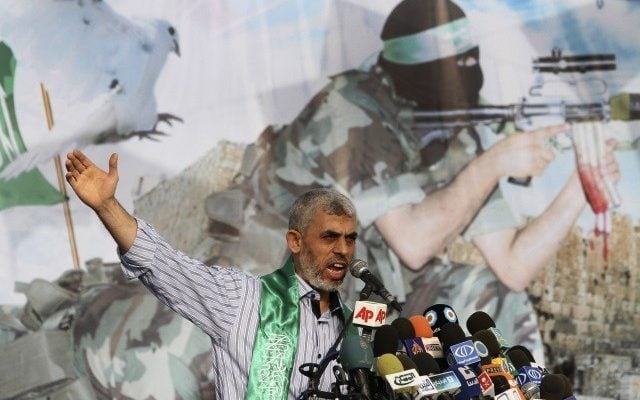Hamas’ leader has confirmed what Israel has been long warning about – Iran is backing Hamas’ terror activities in Gaza, as part of its regional plan to annihilate Israel.
Hamas’ new leader in the Gaza Strip said Monday his group has repaired relations with Iran after a five-year rift and is using its newfound financial and military aid to gear up for new hostilities against Israel.
The announcement by Yahya Sinwar came as United Nations Secretary-General Antonio Guterres was visiting Israel. At a meeting with the UN chief, Prime Minister Benjamin Netanyahu warned about the rising anti-Israel activity by Iran and its allies in the region.
Iran was once the top backer of Hamas, an Islamic terror group that seeks Israel’s destruction. But Hamas broke with Iran in 2012 after the group refused to support Iran’s close ally, Syrian President Bashar Assad, in the Syrian civil war.
During a four-hour meeting with journalists, Sinwar said those ties have been restored and are stronger than ever.
“Today, the relationship with Iran is excellent, or very excellent,” Sinwar said. He added that the Islamic Republic is “the largest backer financially and militarily” to Hamas’ military wing.
It was the first time that Sinwar has met reporters since he was elected in February. The 55-year-old Sinwar, who spent two decades in Israeli prison after being convicted of masterminding the abduction and killing of two Israeli soldiers, has close ties with Hamas’ terror wing and takes a hard line toward Israel.
Sinwar would not say how much aid Iran provides his group. Before the 2012 breakup, Iran provided an estimated $50 million a month to Hamas.
Hamas Getting Closer to Egypt
Hamas violently took control of Gaza from the Palestinian Authority in 2007. Since then, it has fought three wars against Israel. Hamas has murdered thousands of Israelis in suicide bombings, shootings and other attacks. It is considered a terrorist group by Israel, the United States and the European Union.
Sinwar stressed that the Iranian aid is for “rebuilding and accumulating” Hamas’ military powers for a larger fight against Israel that is meant to “liberate Palestine.”
“Thousands of people work every day to make rockets, (dig) tunnels and train frogmen,” he said. “The relationship with Iran is in this context.”
He claimed Hamas does not intend to start a fourth war with Israel, instead preferring to remedy dire living conditions in the impoverished coastal enclave.
Israel and Egypt imposed a blockade on Gaza after the Hamas takeover a decade ago, attempting to thwart Hamas’ military buildup. Trying to pressure Hamas and regain control, Abbas has asked Israel to reduce electricity supplies to Gaza.
The result is that Gaza suffers acute power outages of up to 16 hours a day, unemployment of nearly 50 percent and widespread poverty.
Sinwar has turned to Egypt, which has begun to ease the blockade as it seeks Hamas’ help in controlling their border. The Egyptian military has been fighting an Islamic insurgency in the Sinai desert, near Gaza.
Relations with Cairo “have improved dramatically,” Sinwar said. Egypt has recently sent fuel to ease the power crisis in response to Hamas’ building of a buffer zone along the border.
“We will knock on all the doors, except that of the (Israeli) occupation, to resolve the problems,” he said.
Sinwar was among more than 1,000 Palestinians released by Israel in 2011 in exchange for an Israeli soldier, Gilad Shalit, whom Hamas kidnapped in 2006.
Sinwar said there would be no new talks over a prisoner swap until Israel frees 54 prisoners released in the Shalit swap that have been re-arrested after returning to terrorism.
“We are ready to start negotiations through a mediator, but only when the table is cleaned. Freed prisoners must feel they are immune.”
By: AP





